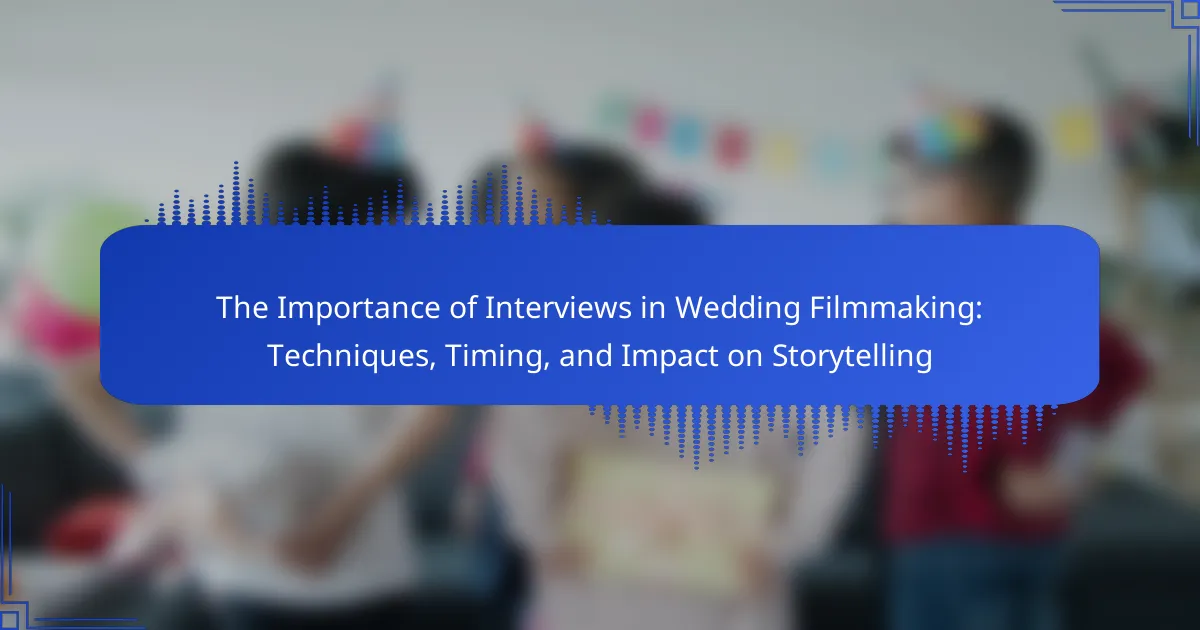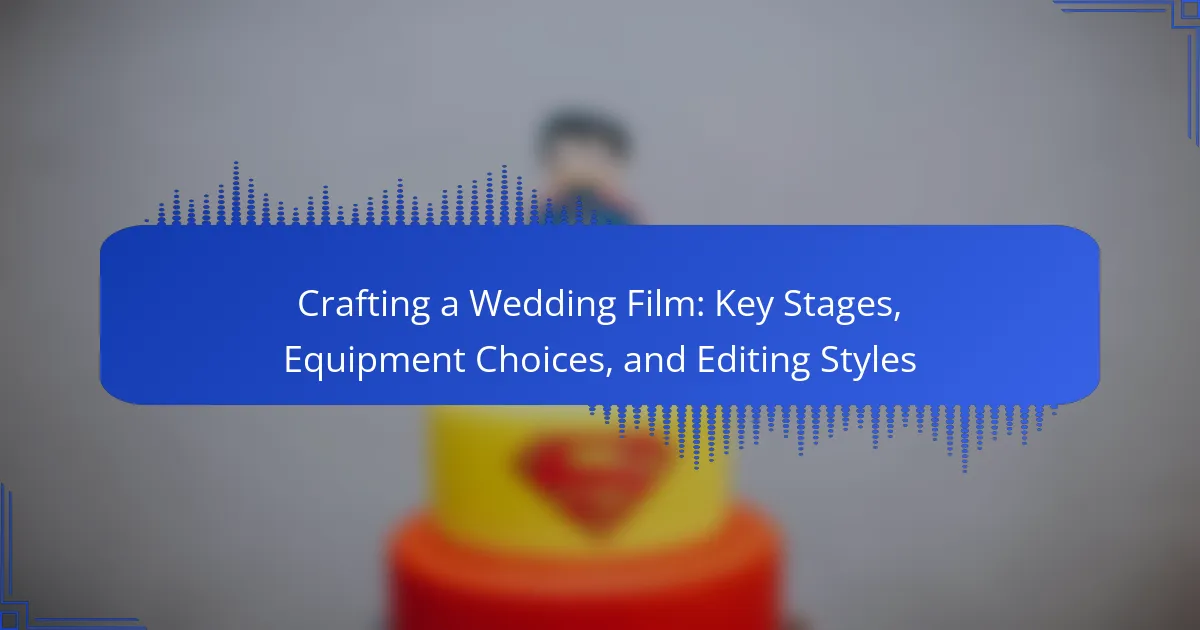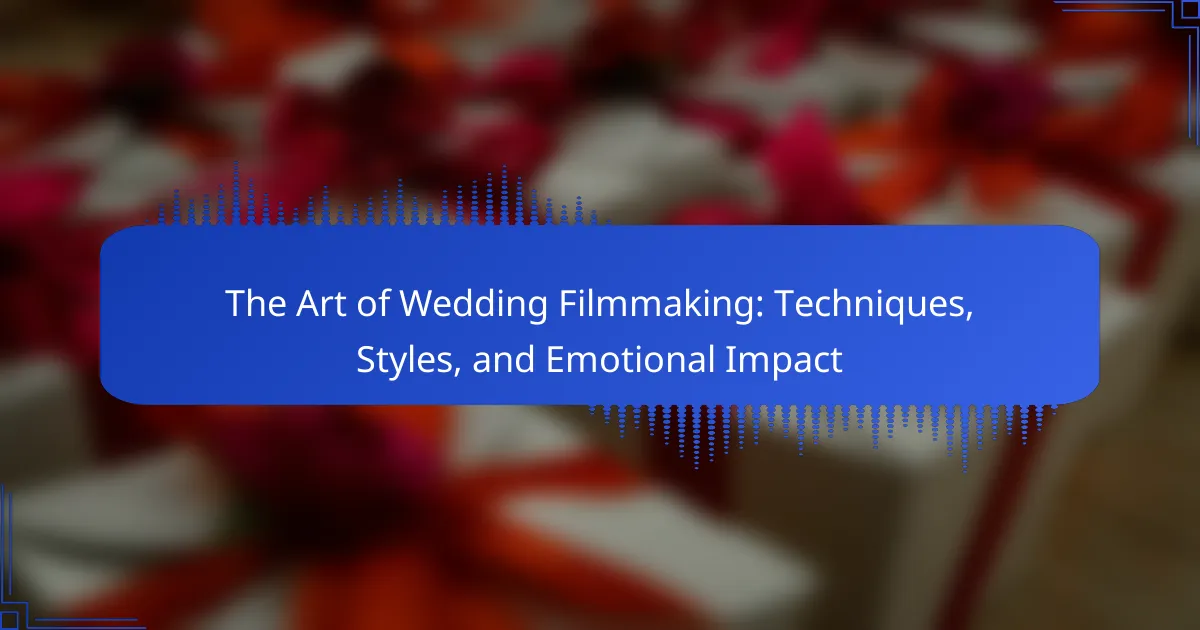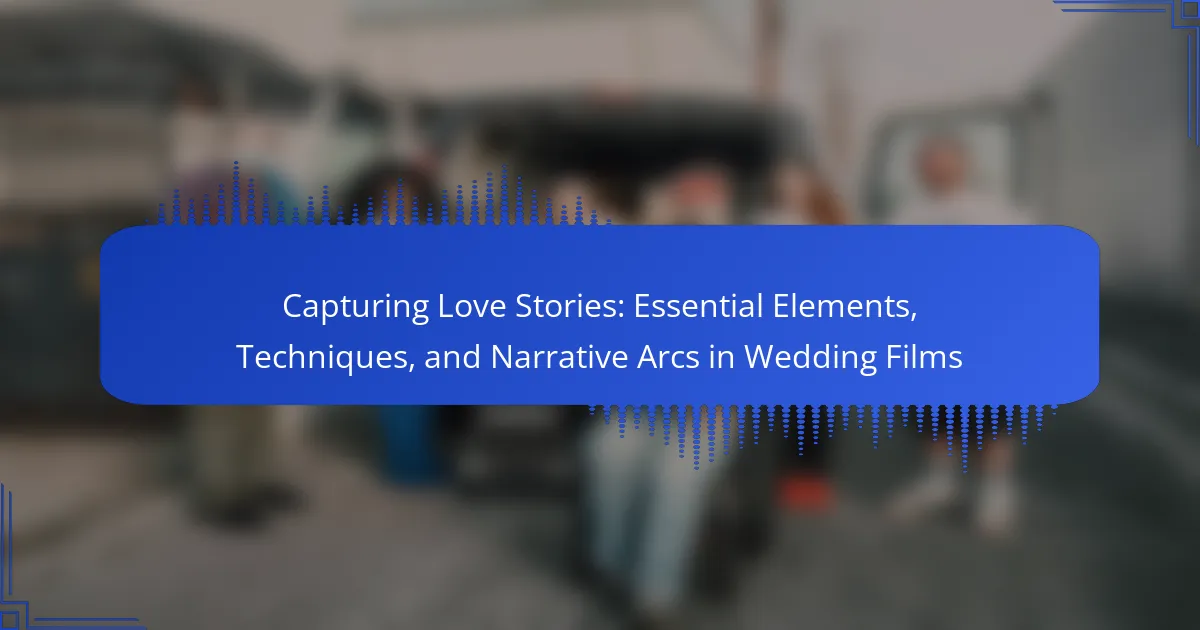Interviews are a key component in wedding filmmaking, serving to capture authentic emotions and personal narratives that enrich the storytelling process. By including heartfelt messages from the couple and their families, filmmakers can convey the couple’s love story and the significance of their wedding day. The article outlines the best timing for conducting interviews, emphasizing the pre-wedding planning phase and the reception, to enhance both emotional depth and context. Additionally, it discusses how strategic use of interviews transforms wedding films from mere documentation into engaging narratives, fostering a stronger connection with the audience.
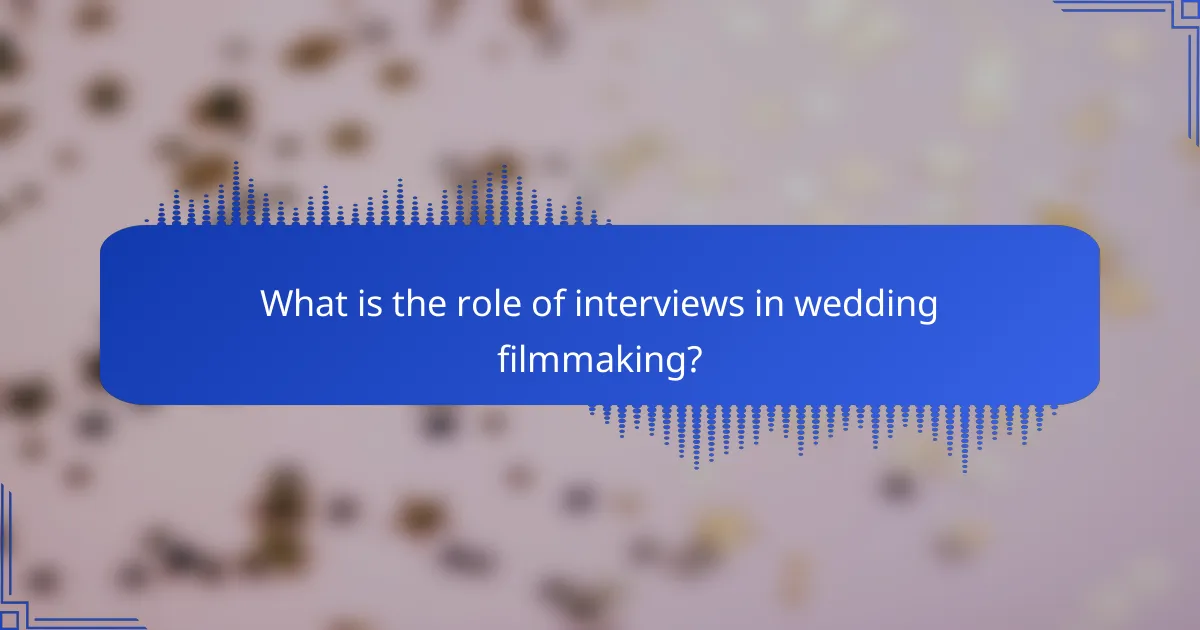
What is the role of interviews in wedding filmmaking?
Interviews play a crucial role in wedding filmmaking by capturing authentic emotions and personal narratives. They provide insights into the couple’s relationship and their journey. Filmmakers use interviews to weave a compelling story that resonates with viewers. These segments often include heartfelt messages and reflections from the couple and their families. This personal touch enhances the emotional depth of the final film. Additionally, interviews help to establish context around key moments of the wedding day. By integrating these voices, filmmakers create a richer, more engaging viewing experience.
How do interviews enhance the storytelling aspect of wedding films?
Interviews enhance the storytelling aspect of wedding films by providing personal insights and emotional depth. They capture the unique perspectives of the couple and their loved ones. This adds authenticity to the narrative. The spoken words convey feelings that visuals alone may not express. Interviews allow for storytelling that reflects the couple’s journey and experiences. They can highlight significant moments and shared memories. By including interviews, filmmakers create a richer, more engaging film. This technique helps to connect viewers emotionally, making the film more memorable.
What types of interviews are commonly used in wedding filmmaking?
Common types of interviews used in wedding filmmaking include couple interviews, family interviews, and guest interviews. Couple interviews capture personal stories and emotions from the bride and groom. Family interviews often include parents or siblings sharing their thoughts and experiences. Guest interviews provide perspectives from friends and relatives, adding depth to the narrative. These interviews help create a more comprehensive and emotional wedding film. Each type of interview contributes unique insights, enhancing storytelling in the final product.
How do personal stories from interviews contribute to emotional engagement?
Personal stories from interviews enhance emotional engagement by creating relatable and authentic connections. These narratives evoke empathy by allowing audiences to see experiences through the interviewee’s perspective. When individuals share personal anecdotes, they humanize the content, making it more accessible and poignant. Research indicates that storytelling can activate emotional responses in listeners, as evidenced by studies showing increased brain activity in areas associated with emotion during narrative experiences. This emotional connection fosters a deeper investment in the story being told, ultimately enriching the overall impact of wedding filmmaking.
What techniques can be employed during interviews for wedding films?
Techniques employed during interviews for wedding films include open-ended questions, active listening, and creating a comfortable environment. Open-ended questions encourage detailed responses, allowing interviewees to share personal stories. Active listening helps filmmakers capture genuine emotions and reactions. Creating a comfortable environment reduces anxiety, leading to more authentic interviews. Additionally, using natural lighting enhances the visual quality of the interview. Framing shots with the background relevant to the couple adds context. Lastly, incorporating B-roll footage during interviews provides visual storytelling elements, enriching the final film.
How should filmmakers prepare for conducting interviews?
Filmmakers should prepare for conducting interviews by researching the interviewee and crafting relevant questions. Understanding the interviewee’s background ensures insightful conversations. Filmmakers should also create a comfortable environment to encourage openness. Testing equipment beforehand is crucial to avoid technical issues during the interview. Preparing a backup plan for unforeseen circumstances is essential. Filmmakers must practice active listening to engage effectively. Establishing a clear narrative focus guides the direction of the interview. These preparation steps enhance the quality of the interview and the overall storytelling process.
What are effective questioning techniques for capturing authentic responses?
Effective questioning techniques for capturing authentic responses include open-ended questions, follow-up inquiries, and active listening. Open-ended questions encourage detailed responses. For example, asking, “What was your favorite moment of the day?” invites elaboration. Follow-up inquiries help clarify and deepen the conversation. Phrasing like, “Can you tell me more about that?” prompts further insight. Active listening involves paying attention to the respondent’s words and emotions. This creates a safe space for sharing. Research shows that these techniques lead to richer, more genuine narratives. By employing these methods, interviewers can enhance the storytelling quality in wedding filmmaking.

When is the best time to conduct interviews in the wedding filmmaking process?
The best time to conduct interviews in the wedding filmmaking process is during the pre-wedding planning phase. This timing allows filmmakers to capture the couple’s expectations and emotions before the event. It also provides insights into personal stories that can enhance the narrative. Conducting interviews at this stage helps in crafting a more tailored and meaningful film. Additionally, early interviews can ease nerves for the couple, making them more comfortable on the wedding day. Interviews can also be conducted during the reception, capturing spontaneous moments and reactions. This approach allows filmmakers to document the event’s atmosphere and interactions. Overall, strategic timing of interviews enhances storytelling in wedding films.
How does the timing of interviews impact the overall film narrative?
The timing of interviews significantly impacts the overall film narrative by shaping the emotional arc and pacing. Interviews conducted during key moments enhance storytelling by providing context and depth. For example, capturing interviews immediately after significant events allows for authentic emotional responses. This immediacy creates a stronger connection between the audience and the subjects. Additionally, strategically placed interviews can build suspense or provide necessary exposition. Research indicates that timing influences viewer engagement, as it affects how information is processed. Properly timed interviews can transform a linear narrative into a compelling, dynamic experience.
What moments during the wedding day are ideal for interviews?
Key moments during the wedding day ideal for interviews include the pre-ceremony preparations, the ceremony itself, and the reception. Pre-ceremony interviews capture emotions and excitement. These moments provide insight into the couple’s feelings before the big event. During the ceremony, capturing vows and reactions adds depth to the storytelling. Reception interviews highlight celebratory moments and guest interactions. Each of these times allows for authentic and emotional content. These interviews enhance the narrative of the wedding film.
How can pre-wedding interviews enhance the final product?
Pre-wedding interviews can significantly enhance the final product of wedding filmmaking. They provide insight into the couple’s personalities and relationship dynamics. This information allows filmmakers to create a more personalized and engaging narrative. Interviews can reveal unique stories and emotions that resonate with viewers. They also help filmmakers understand the couple’s vision for their wedding day. Additionally, pre-wedding interviews can guide the selection of music and visuals that align with the couple’s preferences. By incorporating these elements, the final product becomes a true reflection of the couple’s journey. This approach has been shown to increase viewer engagement and satisfaction with the final film.
What challenges might filmmakers face during interviews and how can they be overcome?
Filmmakers may face challenges such as nervous interviewees, technical issues, and poor audio quality during interviews. Nervous interviewees can lead to unengaging responses. To overcome this, filmmakers should create a comfortable atmosphere and establish rapport before filming. Technical issues, including equipment failure, can disrupt the interview flow. Filmmakers can mitigate this risk by conducting thorough equipment checks prior to interviews. Poor audio quality can result from background noise or inadequate microphones. Filmmakers should select quiet locations and use high-quality audio equipment to ensure clarity. These strategies enhance the overall effectiveness of interviews in wedding filmmaking.
How can filmmakers create a comfortable environment for interviewees?
Filmmakers can create a comfortable environment for interviewees by ensuring a relaxed atmosphere. This includes choosing a quiet, private location for the interview. Comfortable seating arrangements help interviewees feel at ease. Filmmakers should also engage in casual conversation before starting the interview. This builds rapport and trust. Providing clear explanations about the interview process reduces anxiety. Filmmakers can also use soft lighting to create a warm ambiance. Offering refreshments can further enhance comfort. These practices contribute to a positive interview experience, leading to more authentic responses.
What strategies can help in managing time constraints during interviews?
Prioritizing key questions is essential for managing time constraints during interviews. This approach ensures that the most critical topics are addressed first. Setting a clear agenda helps guide the conversation and keeps it focused. Utilizing a timer can assist in monitoring the duration of each segment. Additionally, practicing active listening allows for more efficient follow-up questions. Summarizing responses can also save time and clarify understanding. Finally, being flexible and adapting questions based on the interviewee’s responses can lead to more insightful discussions within limited time.
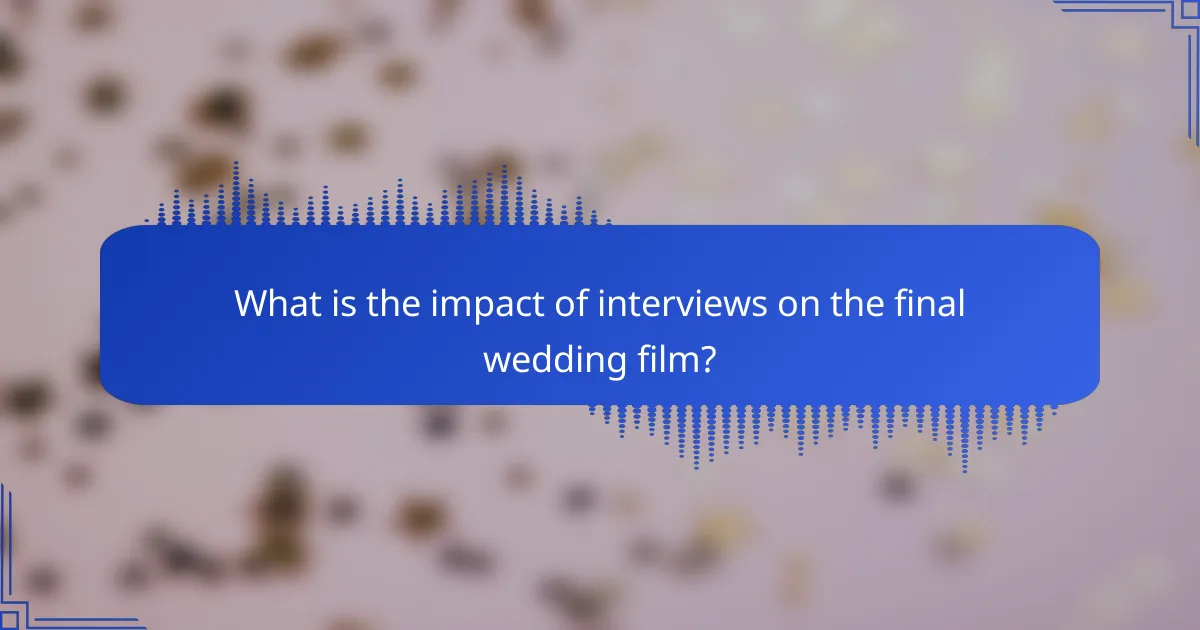
What is the impact of interviews on the final wedding film?
Interviews significantly enhance the final wedding film by providing personal narratives and emotional depth. They allow couples and guests to share their unique perspectives. This adds authenticity to the storytelling. The inclusion of interviews helps convey the couple’s love story and the significance of the event. Interviews can also highlight key moments and relationships that may not be visually captured. By integrating these personal accounts, filmmakers create a more engaging and memorable experience. The emotional resonance generated through interviews often leads to a stronger connection with the audience. Overall, interviews are vital in transforming a wedding film from a simple documentation into a heartfelt narrative.
How do interviews influence audience connection to the story?
Interviews significantly enhance audience connection to the story by providing personal insights and emotional depth. They allow viewers to hear authentic voices, making the narrative relatable. Personal stories shared during interviews create empathy and understanding. This emotional engagement fosters a stronger bond between the audience and the characters. Additionally, interviews can reveal behind-the-scenes perspectives that enrich the overall context. Research indicates that emotional storytelling increases viewer engagement by up to 75%. Therefore, interviews serve as a crucial tool in wedding filmmaking to deepen the audience’s connection to the story.
What role do interviews play in highlighting key relationships?
Interviews play a crucial role in highlighting key relationships in wedding filmmaking. They capture personal stories and emotions that define the connections between individuals. Through interviews, filmmakers can extract meaningful anecdotes that reveal the depth of relationships. This process helps to create a narrative that resonates with viewers. Additionally, interviews provide insights into the couple’s journey, showcasing their bond and shared experiences. By incorporating these personal elements, filmmakers enhance the storytelling aspect of the wedding film. This approach fosters a deeper emotional engagement with the audience, making the film more memorable.
What best practices should filmmakers follow for effective interviews?
Filmmakers should prepare thoroughly for effective interviews. This includes researching the interviewee’s background and story. Developing a list of open-ended questions helps facilitate a natural conversation. Setting up the interview in a quiet, well-lit location enhances audio and visual quality. Building rapport with the interviewee creates a comfortable atmosphere. Active listening allows filmmakers to ask follow-up questions based on responses. Using multiple camera angles can provide visual interest and context. Finally, being adaptable during the interview can lead to unexpected insights.
How can filmmakers ensure they capture high-quality audio and video during interviews?
Filmmakers can ensure high-quality audio and video during interviews by using professional equipment. High-quality microphones, such as lavalier or shotgun mics, capture clear audio. Proper placement of microphones minimizes background noise and enhances sound clarity. Additionally, filmmakers should use cameras with good low-light performance for clear video in various settings.
Stabilization tools like tripods or gimbals prevent shaky footage. Filmmakers should also pay attention to lighting; natural light or soft diffused lights create flattering visuals. Conducting sound checks before filming ensures audio levels are appropriate. Finally, monitoring audio and video in real-time helps catch issues immediately. These practices lead to professional and engaging interview footage.
What post-production techniques can enhance the impact of interview footage?
Using post-production techniques can significantly enhance the impact of interview footage. Techniques such as color grading can improve the visual appeal and mood of the footage. Audio enhancement, including noise reduction and equalization, ensures clarity in dialogue. Additionally, incorporating B-roll footage can provide context and visual interest. Using cutaways can maintain viewer engagement and emphasize key points. Transitions and pacing adjustments can create a more dynamic flow. Adding text overlays can highlight important quotes or information. Finally, using background music can evoke emotions and enhance storytelling. Each of these techniques contributes to creating a more compelling and polished final product.
What tips can help filmmakers improve their interview techniques for wedding films?
Filmmakers can improve their interview techniques for wedding films by preparing thoughtful questions in advance. This ensures that the interviews flow smoothly and cover essential topics. Establishing a comfortable environment helps interviewees feel at ease, leading to more genuine responses. Active listening is crucial; it allows filmmakers to ask follow-up questions that deepen the conversation. Using open-ended questions encourages detailed answers, providing richer content for the film. Additionally, maintaining eye contact fosters connection and trust between the filmmaker and the interviewee. Lastly, reviewing footage after initial interviews can help identify areas for improvement in future sessions.
The main entity of the article is interviews in wedding filmmaking. The article outlines the essential role interviews play in capturing authentic emotions and personal narratives, enhancing storytelling and audience connection. It discusses various types of interviews, effective questioning techniques, and the importance of timing in the filmmaking process. Additionally, it highlights challenges filmmakers may face during interviews and provides strategies for creating a comfortable environment, ensuring high-quality audio and video, and employing post-production techniques to maximize impact. Overall, the article emphasizes how interviews contribute to a richer, more engaging wedding film narrative.
